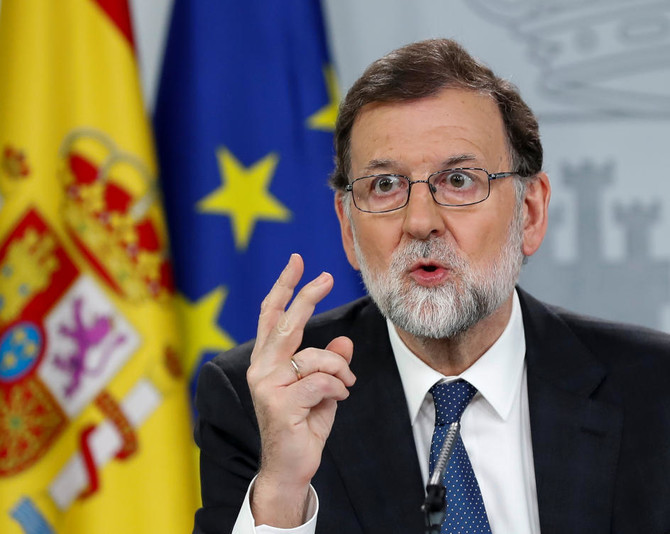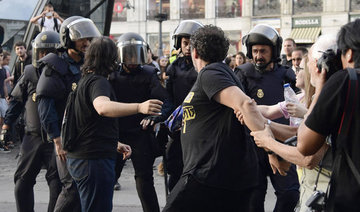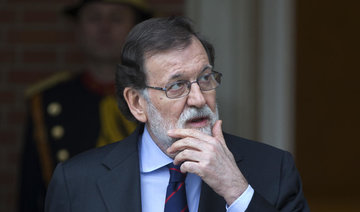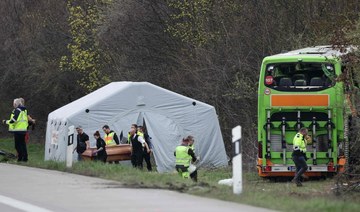MADRID: Spanish opposition parties launched a fierce campaign Friday to end the conservative government of Mariano Rajoy after courts ruled that his Popular Party profited from a large kickbacks-for-contracts scheme.
The Socialist opposition announced a vote of no confidence against the prime minister with the backing of anti-establishment and left-wing parties, while the pro-business Ciudadanos (Citizens) — which had supported the conservative minority government until now — urged Rajoy to call a fresh election.
But Rajoy ruled out stepping down, saying he was committed to remaining in power until the end of his term, in 2020.
“All this is nonsense,” the 63-year old conservative politician told reporters in a televised press conference. He called the opposition’s move “opportunist,” and said the no-confidence vote “goes against the stability in Spain, damages the economic recovery, introduces uncertainty and goes against the interests of all citizens.”
The moves followed the conviction of 29 businesspeople and former Popular Party officials for crimes including fraud, tax evasion and money laundering over the 1999-2005 illegal scheme that, according to Thursday’s court decision, helped fund the ruling party.
The ruling triggered “social indignation” that has put Spain “in a situation of an extreme institutional crisis,” Socialist leader Pedro Sanchez said Friday.
“There is only one person responsible for the political disaffection,” he told reporters. “That person is called Mariano Rajoy.”
Parliamentary rules in Spain require a proposal of an alternative prime minister in a no-confidence vote.
Sanchez said he will call elections if he wins the vote. Meanwhile, the popular center-right Ciudadanos (Citizens) party urged Rajoy to call elections or threatened to push for a separate no confidence vote.
“We need a clean and strong government to confront the separatist defiance (in Catalonia),” its leader, Albert Rivera, tweeted.
No date has been set for the vote, but it could be as early as next week according to parliamentary rules. The Socialists will need at least 176 of the 350 votes in the national congress, where they only control 84 seats as opposed to 136 held by the Popular Party.
Although the Socialists have enlisted the backing of 71 leftwing and anti-establishment lawmakers, they would need the 32 extra votes of the pro-business Ciudadanos, which is reluctant to side with the left-wing or the Catalan separatists.
A successful motion of no confidence is unlikely at this stage, said Antonio Barroso, an analyst with the London-based Teneo Intelligence consultancy firm. “Opposition parties will likely engage in a blame game rather than effectively coordinate to get rid of Rajoy,” he said.
Friday’s political jockeying comes after a roller-coaster ride this week for Rajoy’s party, whose win on Wednesday of a key approval for the 2018 national budget had secured, in theory, enough breathing space for him to survive until the end of the term, in 2020.
But the setback came less than 24 hours later in the form of a 1,687-page ruling on the so-called Gurtel case, considered one of the gravest corruption episodes in Spain’s modern history.
The judges issued prison sentences totaling 351 years and a 245,000-euro fine ($ 287,000) for the conservative party in power, which the ruling describes as a “profit-seeking participant” in the scheme.
The verdict also considered that a network involving companies and party officials was established to arrange travel and organize events for PP in exchange for public contracts.
In some of the most damaging parts of the ruling, the judges said that PP ran a slush fund at least until 2008 and questioned the credibility of Rajoy when he denied knowing that the scheme was in place during a court hearing where the prime minister testified as a witness.
The convictions immediately triggered turmoil for Rajoy, who is combating separatist defiance in Catalonia and has for years defended his party against dozens of corruption allegations. Spain’s leading El Pais newspaper opened its Friday editorial calling Rajoy’s cabinet a “zombie government.”
The ruling party has said it will appeal the part of the verdict that found it was a profit-seeking participant in the scheme.
Rajoy, who has said he wants to run for a third term as prime minister after 2020, repeated on Friday that nobody in the current administration or in the party’s leadership was aware of any wrongdoing, and that the court ruling only fines his party without handing any criminal charges.
Spanish stocks plummeted on Friday as the political crisis unfolded, with the benchmark Ibex 35 index losing around 2 percent of its value by mid-afternoon.
Spanish PM Mariano Rajoy on the ropes over party graft case
Spanish PM Mariano Rajoy on the ropes over party graft case

- The Socialist opposition announced a vote of no confidence against the prime minister with the backing of anti-establishment and left-wing parties.
- The moves followed the conviction of 29 businesspeople and former Popular Party officials for crimes including fraud, tax evasion and money laundering.
Sweltering heat across Asia was 45 times more likely because of climate change, study finds

ENGALURU, India: Sizzling heat across Asia and the Middle East in late April that echoed last year’s destructive swelter was made 45 times more likely in some parts of the continent because of human-caused climate change, a study Tuesday found.
Scorching temperatures were felt across large swaths of Asia, from Gaza in the west — where over 2 million people face clean water shortages, lack of health care and other essentials due to Israeli bombardment — to the Philippines in the southeast, with many parts of the continent experiencing temperatures well above 40 degrees Celsius (104 degrees Fahrenheit) several days in a row.
The study was released by the World Weather Attribution group of scientists, who use established climate models to quickly determine whether human-caused climate change played a part in extreme weather events around the world.
In the Philippines, scientists found the heat was so extreme it would have been impossible without human-caused climate change. In parts of the Middle East, climate change increased the probability of the event by about a factor of five.
“People suffered and died when April temperatures soared in Asia,” said Friederike Otto, study author and climate scientist at Imperial College in London. “If humans continue to burn fossil fuels, the climate will continue to warm, and vulnerable people will continue to die.”
At least 28 heat-related deaths were reported in Bangladesh, as well as five in India and three in Gaza in April. Surges in heat deaths have also been reported in Thailand and the Philippines this year according to the study.
The heat also had a large impact on agriculture, causing crop damage and reduced yields, as well as on education, with school vacations having to be extended and schools closed in several countries, affecting thousands of students.
Myanmar, Laos and Vietnam broke records for their hottest April day, and the Philippines experienced its hottest night ever with a low of 29.8 degrees Celsius (85.6 degrees Fahrenheit). In India, temperatures reached as high as 46 degrees Celsius (115 degrees Fahrenheit). The month was the hottest April on record globally and the eleventh consecutive month in a row that broke the hottest month record.
Climate experts say extreme heat in South Asia during the pre-monsoon season is becoming more frequent and the study found that extreme temperatures are now about 0.85 degrees Celsius (1.5 Fahrenheit) hotter in the region because of climate change.
Internally displaced people, migrants and those in refugee camps were especially vulnerable to the searing temperatures, the study found.
“These findings in scientific terms are alarming,” said Aditya Valiathan Pillai, a heat plans expert at New Delhi-based think tank Sustainable Futures Collaborative. “But for people on the ground living in precarious conditions, it could be absolutely deadly.” Pillai was not part of the study.
Pillai said more awareness about heat risks, public and private investments to deal with increasing heat and more research on its impacts are all necessary to deal with future heat waves.
“I think heat is now among the foremost risks in terms of personal health for millions across the world as well as nations’ economic development,” he said.
Amsterdam university cancels classes after violence erupted at a pro-Palestinian rally

- Israel has killed more than 35,000 Palestinians, according to Gaza’s Health Ministry
- The protest was one of many that sprung up around Europe following rallies across college campuses in the United States
THE HAGUE: The University of Amsterdam canceled classes Tuesday and shut buildings for two days after the latest pro-Palestinian demonstrations over the war in Gaza turned destructive.
Protests continued to simmer at several European universities where students faced off with academic authorities on whether relations with Israel should be broken off or drastically reduced, as the death toll continues to climb during the seven-month Israel-Hamas war.
Overall, the protests in Europe have failed to reach the intensity of demonstrations at several US universities.
In the Netherlands, the board at the nearly 400-year old University of Amsterdam issued a statement saying it could not guarantee the safety of anyone on campus after a group of masked agitators barricaded doors and spray painted slogans on the walls.
The mayhem on Monday followed a peaceful walkout of staff and students against the Israel-Hamas war and the university’s response to earlier protests.
“They (the university) called in the police after people wouldn’t remove their face coverings but the police came in balaclavas,” political science professor Enzo Rossio told The Associated Press, describing Monday’s events. He had returned to his office following the walkout, only for the building to be evacuated minutes later.
While standing outside the building, Rossio said he and his wife, who also works for the university, were repeatedly hit by police with batons.
Last week, police used a bulldozer to evict demonstrators from an encampment established by students who want the university to cut ties with Israel. The protest was one of many that sprung up around Europe following rallies across college campuses in the United States.
Smaller demonstrations have taken place against the war, both at the University of Amsterdam and at other Dutch universities. But last week’s protest grew into the thousands, with demonstrators chanting slogans including, “Palestine will be free!” and “Cops off campus!”
Riot police were called in multiple times to end the demonstrations, leading to aggressive confrontations. “I’ve never witnessed this kind of violence,” history student Marin Kuijt said in an interview. Kuijt said he had regularly attended climate change marches and joined the walkout on Monday to protest against the university and police response.
After the walkout, some students set up tents inside buildings, intending to occupy the spaces until the university listened to their demands. According to the University of Amsterdam, the peaceful protest was “hijacked by violent elements” who left behind “wanton destruction.”
Higher education institutions in the Netherlands published guidelines on Tuesday for student protests. They include a ban on remaining overnight, occupying buildings and wearing face coverings. Last week, the University of Amsterdam already announced it would not hold talks with any protester who refused to show their face.
In a statement, Amsterdam Student Encampment, which is organizing some of the demonstrations, said it was concerned about outside elections causing destruction, saying it “overshadowed” the protests. The group is calling for more demonstrations at the university in the coming days.
Smaller students actions were held in Belgium, Greece and Italy, among other EU nations.
UK Mideast minister: Israel’s actions leaving its allies ‘pretty challenged’

- Lord Ahmad: Many are uneasy about adherence to international humanitarian law
- UK FM opposes arms ban despite ‘grave concerns around humanitarian access issue in Gaza’
LONDON: The UK’s Middle East minister has warned that the war in Gaza is causing Israel’s allies numerous problems over allegations that it has broken international humanitarian law, the Daily Telegraph reported.
“I think Israel is really leaving many of its partners, including ourselves, pretty challenged on where we are currently on the issue of IHL, and how they are fulfilling their obligations,” Lord Ahmad told the House of Commons Foreign Affairs Committee on Tuesday.
“Israel has obligations. We are allies of Israel and as a constructive friend to Israel, we’d land these points very directly to them.”
On Sunday, UK Foreign Secretary David Cameron said an arms ban against Israel would not be “a wise path.”
In April, he said the UK’s stance on selling arms to Israel was “consistent with the advice that I and other ministers have received, and as ever we will keep the position under review.
“Let me be clear, though, we continue to have grave concerns around the humanitarian access issue in Gaza.”
UK law requires a ban on the sale of weapons to states that breach or fall short of adhering to international humanitarian law.
So far Canada, Japan, Spain, Belgium and the Netherlands have suspended arms sales to Israel. The UK’s main opposition Labour Party called for a halt on exports this week.
8 dead, at least 40 injured as farmworkers’ bus overturns in central Florida

- The bus was transporting 53 farmworkers at about 6:40 a.m. when it collided with a truck
- The workers were being transported to Cannon Farms in Dunellon
FLORIDA: A bus carrying farmworkers in central Florida overturned on Tuesday, killing eight people and injuring about 40 other passengers, authorities said.
The bus was transporting 53 farmworkers at about 6:40 a.m. when it collided with a truck in Marion County, north of Orlando, the Florida Highway Patrol said.
Authorities say the bus swerved off State Road 40, a straight but somewhat hilly two-lane road that passes through farms. It crashed through a fence and ended up on its side in a field. The workers were being transported to Cannon Farms in Dunellon, which has been harvesting watermelons.
Photos taken by the Ocala Star-Banner at the scene show the bus lying on its side with both its emergency rear door and top hatch open. The truck that hit it shows extensive damage to its driver’s side.
There is no immediate indication that weather was a factor.
“We will be closed today out of respect to the losses and injuries endured early this morning in the accident that took place to the Olvera Trucking Harvesting Corp.,” Cannon Farms announced on its Facebook page. “Please pray with us for the families and the loved ones involved in this tragic accident. We appreciate your understanding at this difficult time.”
Cannon Farms describes itself as a family owned commercial farming operation that has farmed its land for more than 100 years, focusing now on peanuts and watermelons, which it sends to grocery stores across the US and Canada.
No one answered the phone at Olvera Trucking on Tuesday afternoon. The company had recently advertised for a temporary driver to bus workers to watermelon fields. The driver would then operate harvesting equipment. The pay was $14.77 an hour.
Harvard students end protest as university agrees to discuss Middle East conflict

- The student protest group Harvard Out of Occupied Palestine said in a statement that the encampment “outlasted its utility with respect to our demands”
- Students at many college campuses this spring set up similar encampments
CAMBRIDGE, Massachusetts: Protesters against the war between Israel and Hamas were voluntarily taking down their tents in Harvard Yard on Tuesday after university officials agreed to discuss their questions about the endowment, bringing a peaceful end to the kinds of demonstrations that were broken up by police on other campuses.
The student protest group Harvard Out of Occupied Palestine said in a statement that the encampment “outlasted its utility with respect to our demands.” Meanwhile, Harvard University interim President Alan Garber agreed to pursue a meeting between protesters and university officials regarding the students’ questions.
Students at many college campuses this spring set up similar encampments, calling for their schools to cut ties with Israel and businesses that support it.
The latest Israel-Hamas war began when Hamas and other militants stormed into southern Israel on Oct. 7, killing around 1,200 people and taking an additional 250 hostage. Palestinian militants still hold about 100 captives, and Israel’s military has killed more than 35,000 people in Gaza, according to Gaza’s Health Ministry, which doesn’t distinguish between civilians and combatants.
Harvard said its president and the dean of the Faculty of Arts and Sciences, Hopi Hoekstra, will meet with the protesters to discuss the conflict in the Middle East.
The protesters said they worked out an agreement to meet with university officials including the Harvard Management Company, which oversees the world’s largest academic endowment, valued at about $50 billion.
The protesters’ statement said the students will set an agenda including discussions on disclosure, divestment, and reinvestment, and the creation of a Center for Palestine Studies. The students also said that Harvard has offered to retract suspensions of more than 20 students and student workers and back down on disciplinary measures faced by 60 more.
“Since its establishment three weeks ago, the encampment has both broadened and deepened Palestine solidarity organizing on campus,” a spokesperson for the protesters said. “It has moved the needle on disclosure and divestment at Harvard.”





















